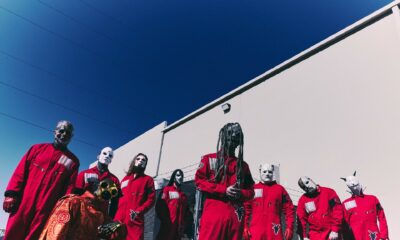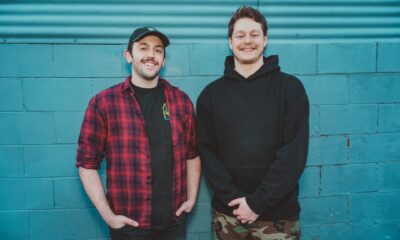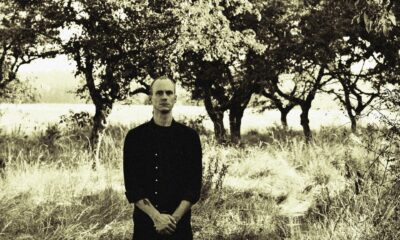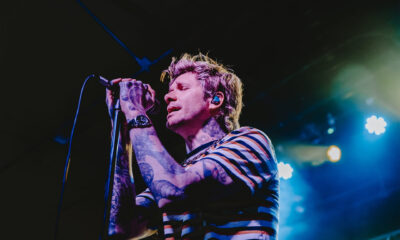Interviews
Voluptas Discuss Classical Culture, Black Metal, Saxophones and… Twin Peaks?

Czech psychedelic/experimental black metal outfit Voluptas released their latest album Towards the Great White Nothing this past September via Metalgate. Their cerebral approach made our ears prick up here at V13, so we simply had to ask them a few questions about the record, their influences and the state of Czech extreme metal.
The name Voluptas directly translates from Latin as ‘pleasure.’ It can also be tied, mythologically speaking, to the daughter of Cupid and Psyche, herself a goddess of sensuality and pleasure. How do you justify this softer, hedonistic terminology with the style of music you produce?
Štěpán: “Just a few months after we started the band (in spring 2006) we already had a gig coming up, so we needed a name quickly and no one had any relevant ideas. At that time I was studying for my Latin exam and I liked the word voluptas, the look and sound of it. It was more appropriate in terms of meaning as well at that time, we played something like crossover/alternative rock/punk. In retrospect, I’m not sure if we would choose this name again, but it’s just something that stuck with us… After all, we still consider music our pleasure.”
The influence of classical culture is obvious in track names as well, such as allusions to the Greek festival, “Thargelia.” Is this intended as a personal or educational aspect of the record?
Martin: “When we started to actually write lyrics (way after 2006), I had to find the right style to match already existing songs… so I tried to write something inspired by Twin Peaks, another song was about nature and pantheism, another one used biblical imagery and so on. Our lyrics are stylized to match the music and there are lots of things I want to write but I censor myself, and I always abstain from the profane. Most of them are really personal, but they are always very metaphorical. This thing with Greek and Roman mythology is just a part of my ‘encyclopedia’ that I use to convey what I want. Other parts of this vocabulary are William Blake, H.P. Lovecraft, John Milton or the Bible.
I might also be influenced by my education. I’ve spent many years reading philosophy and there is a certain inclination towards the old times. Many authors use Greek vocabulary, albeit sometimes more for its aesthetics (which I actually don’t like, I prefer a cleaner and more analytic approach, neologisms etc.) But then again, this is no philosophy, only words to be screamed by Michal, so I am sometimes more concerned with the aesthetics than the meaning as well.”
You cite direct influences that include Ulver, Dodheimsgard, Ved Buens Ende, Enslaved. Negura Bunget and others, but the majority of these fall more towards experimental than psychedelic. Would you describe your music as more experimental or more psychedelic?
Štěpán: “It depends on the band (and album), but I find them experimental and psychedelic almost equally (not so much in the case of Ulver black metal stuff, but for the rest, yes).’”
Jan: “We are certainly inspired by psychedelic music and we like to play around and experiment in our approach to black metal, but let’s face it, we are not that experimental by today’s standards. And while psychedelia may well be an important aspect of our music, it is probably not its main pillar.”
On the subject of psychedelic black metal, both Oranssi Pazuzu (Mestarin kynsi, 2020) and Blut Aus Nord (Hallucinogen, 2019) have recently released great albums that are grouped in this genre. How would you say Towards the Great White Nothing compares, purely in terms of style?
Štěpán: “I find Hallucinogen (paradoxically) just slightly psychedelic, rather, I perceive it as progressive (in leads/solos), melodic and rock-catchy. Their albums of the 2000s seem to me much more psychedelic (especially MoRT), in terms of how I understand psychedelia. It’s a decent album, but I prefer their older, more dissonant stuff. As for the last Oranssi Pazuzu album (read our review), there is actually not so much of black metal (just the vocals, the last track and a few short passages in the rest of the songs). I like it, especially the experimentation with electronics and classical minimalism, but I also prefer their first two albums and Värähtelijä.
So it seems to me a little bit strange to call these albums psychedelic black metal and I find them difficult to compare with us. Both bands are one of the many minor influences for us (particularly older albums), but we are still more of a traditional black metal band than them.”
“Between Terror and Erebus” seems to refer to the volcano in Antarctica. Is this also where the album name, Towards the Great White Nothing comes from?
Martin: “You are right there is a mention of Mt. Erebus, so the volcano is also there, but both volcanoes were named after two ships, HMS Terror and HMS Erebus, that were a part of the tragic Franklin northern expedition, which served me as the main inspiration. I needed a simple metaphor because I wanted to convey a strong feeling. And when we had our material done and we wanted to name the whole thing, all band members unanimously voted for this line from this song. It could’ve been because this album is colder and more wintery than our previous stuff.”
You also describe the Voluptas sound as being influenced by the Norwegian avant-garde. The generous sampling of different styles throughout Towards the Great White Nothing very accurately recalls classics like Carpathian Forest’s Strange Old Brew (2000), but with a less confrontational approach. Do you find that the calmer, more menacing attitude you exhibit is more effective than the balls-to-the-wall assault of that album?
Martin: “(laughs), I would say that Strange Old Brew is pretty menacing as well. But it is very hard to say what is more effective. SOB is definitely fun to listen, it is ballsy and it doesn’t fuck around. We, on the other hand, tend to fuck around a little, (laughs).”
Michal: “Fun fact, a couple of years ago (before Ved Rums Ende was released) we used to play a live cover version of the self-titled Carpathian Forest song. So if you hear some similarity between our music and theirs, there could actually be some direct influence.”
Several Bandcamp comments describe elements of your album as ‘jazzy.’ Do you think this is purely the incorporation of the saxophone, or are there deeper, more abstract facets to the compositions that give this impression?
Štěpán: “Sure, it’s mainly because of the use of the saxophone, but I think that we are sometimes slightly ‘jazzy’ in composition, approach or methods, especially in some parts of ‘Crystalline Key,’ ‘Of Gnosis and Agony,’ and ‘Desert Twillight.’ In fact, our saxophonist was primarily influenced by modern/avantgarde classical composer Alban Berg when preparing his parts in ‘Desert Twilight.’ But there is also some improvised free-jazzy feeling, of course.”
On the same subject, the overwhelming fan favorite off of Towards the Great White Nothing is the exploratory and ambient “Desert Twilight.” Apart from the aforementioned brass section, what do you think makes this sprawling, long-format song so appealing?
Štěpán: “I mean, there is some psychedelia and hypnotism, particularly in the first part (it was originally influenced by the drone-rock of Earth and Barn Owl, but also some oriental-sounding musical scales), some death/doom section and black metal riffs inspired by eastern bands (like older Negură Bunget). There are a lot of contrasts and variety in this song, but it’s also relatively catchy (I think). And, last but not least, there is the noise/drone/ambient sax-fueled second part of the song, which is probably interesting for people who are into this stuff.”
Throughout Towards the Great White Nothing there is a constant interplay of contrasts: minimal versus immersive, frantic versus controlled, clean versus raw. Is this dynamic tension intended or accidental?
Michal: “We can say the contrasts are intended but not really forced. The music was composed not to have as many contrasts as possible but mainly to be dynamic and interesting for us as musicians but also as listeners. So when the song changes from calm to aggressive or clean to raw and vice versa, it was composed this way because that’s how it feels organic to us.”
Martin: “I believe that the music is not only extreme because it is loud or obscene, but because it is dynamic. And because we are not the loudest band in the world and we are not obscene we need to be more dynamic (laughs).”
The ritualistic atmosphere you create on the record automatically generates its own profound and introspective ambience, so I would love to know how does Towards the Great White Nothing translate into a live setting?
Michal: “Since all the songs, with exception of the ‘Desert Twilight’ ambient finale, were composed and performed live before being recorded, we believe we are able to perform them live as powerfully as on the album. Of course, there is always a higher probability of making some mistakes but on the other hand, with the appropriate setup, sound, lights and venue, the overall impression from these songs could become even stronger.
And, speaking of the ‘Desert Twilight’ ending, this was performed live only once in a slightly different version but I would say quite successfully. Since it was partially improvised during the recording, it will never sound the same at concerts, but we would like to continue with similar experiments during future live gigs as soon as we come up with some strong material in this vein.”
What, if anything, has changed in your songwriting and recording process since Ved Rums Ende?
Martin: “Compared to Ved Rums Ende, Towards the Great White Nothing is certainly more compact and more black metal-oriented. The debut was more like a compilation of early material, as the songs were composed across a huge timeframe and in a shifting lineup, with each member preferring different music. On one hand, this brought diversity to the music of Voluptas, on the other hand, each song was different. It took some time for us to find our own face, and hopefully it shows on the new piece, which for the most part was composed by the current lineup, where we already can largely agree on how things should sound like.
So, the reason why everything fits together better is our greater cohesion, a clearer idea as to what we want to do, and the fact that we all like black metal. Truth remains that some disorderliness is one of the elements of our music. We do not want all songs to sound uniform, which is why there is a saxophone again in one song, a bit of kraut rock in another, or a noise outro. The oscillation between the black metal tradition and the tendency to experiment is for us kind of like struggling with a pig in a mud… and likely will continue to be so.”
Once the whole pandemic does fade into memory, are there plans to take the album on tour?
Michal: “There was a plan to organize a release party in Prague. We even invited a couple of great Czech bands to play with us. Unfortunately, it got cancelled because of government restrictions. Once it is possible, we would like to return to the original idea, ideally with the same bands, even though it will no longer be a proper release party. We have never been very active in terms of live gigs, so there’s not going to be any big tour. On the other hand, since Towards the Great White Nothing has been receiving good reviews, it would be nice to play at least a couple of gigs dedicated to this record during the year together with some new stuff we are currently working on.”
Lastly, the obvious association any metal journalist makes with ‘Czech black metal’ is the legendary Master’s Hammer. What deeper insights into the Czech extreme metal scene can you offer, especially in terms of other artists worth exploring?
Štěpán: “Master’s Hammer are a legend of course, and their first two albums were very influential for black metal bands worldwide. It’s a pity that people who don’t understand Czech really well cannot fully appreciate the lyrics on Jilemnický Okultista. It’s a true gem. Some translations exist, but that is not enough. If you are into Master’s Hammer, you should also check out Necrocock (Master’s Hammer’s guitarist), at least his album Lesní hudba. From newer bands, I can recommend Plague Porter (dissonant death/black metal), Ing. Kralik,Techno (don’t be confused by the name, actually it’s crazy extreme dissonant metal), Oči vlka (black metal), or the Masáž / Massola split (alternative/progressive/jazzy grind/rock/metal/punk). madebythefire play excellent math/progressive rock (or math-screamo without vocals), Do Shaska! are a hidden cvlt of dark dub/post-industrial/ambient (they tag it hexendub).
And we also have (or maybe rather used to have?) strong and relatively original grindcore (and other influences) scene, Gride, Pigsty, !T.O.O.H.!, Contrastic, Ahumado Granujo, and Lycanthrophy, to name a few.”
-
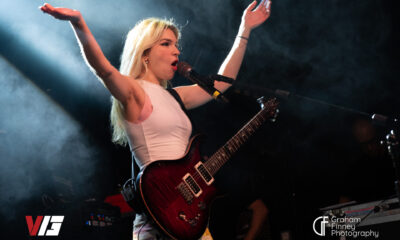
 Alternative/Rock1 week ago
Alternative/Rock1 week agoThe Warning Shake the Foundations of a Sold-Out Leeds Stylus [Photos]
-
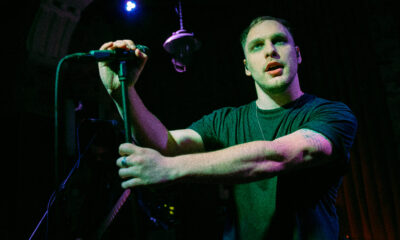
 Alternative/Rock19 hours ago
Alternative/Rock19 hours agoThe Cruel Knives Headline Top Night of British Rock at Manchester’s The Lodge [Photos]
-

 Music2 weeks ago
Music2 weeks agoTake That (w/ Olly Murs) Kick Off Four-Night Leeds Stint with Hit-Laden Spectacular [Photos]
-

 Alternative/Rock2 hours ago
Alternative/Rock2 hours agoThe V13 Fix #012 w/ Dååth, Unearthly Rites, maybeshewill and more
-

 Alternative/Rock1 week ago
Alternative/Rock1 week agoThe V13 Fix #011 w/ Microwave, Full Of Hell, Cold Years and more
-

 Features2 weeks ago
Features2 weeks agoTour Diary: Gen & The Degenerates Party Their Way Across America
-

 Indie1 week ago
Indie1 week agoDeadset Premiere Music Video for Addiction-Inspired “Heavy Eyes” Single
-

 Folk1 week ago
Folk1 week agoKatherine Perkins Strikes the Right Tone with Her “Hold On” Music Video Premiere


